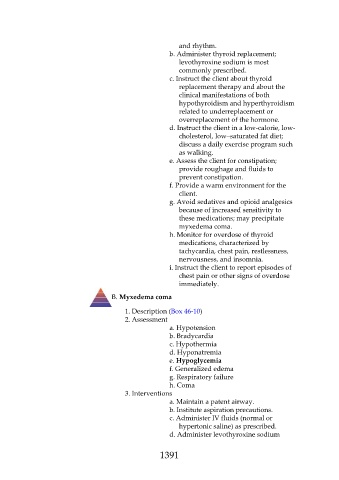Page 1391 - Saunders Comprehensive Review For NCLEX-RN
P. 1391
and rhythm.
b. Administer thyroid replacement;
levothyroxine sodium is most
commonly prescribed.
c. Instruct the client about thyroid
replacement therapy and about the
clinical manifestations of both
hypothyroidism and hyperthyroidism
related to underreplacement or
overreplacement of the hormone.
d. Instruct the client in a low-calorie, low-
cholesterol, low–saturated fat diet;
discuss a daily exercise program such
as walking.
e. Assess the client for constipation;
provide roughage and fluids to
prevent constipation.
f. Provide a warm environment for the
client.
g. Avoid sedatives and opioid analgesics
because of increased sensitivity to
these medications; may precipitate
myxedema coma.
h. Monitor for overdose of thyroid
medications, characterized by
tachycardia, chest pain, restlessness,
nervousness, and insomnia.
i. Instruct the client to report episodes of
chest pain or other signs of overdose
immediately.
B. Myxedema coma
1. Description (Box 46-10)
2. Assessment
a. Hypotension
b. Bradycardia
c. Hypothermia
d. Hyponatremia
e. Hypoglycemia
f. Generalized edema
g. Respiratory failure
h. Coma
3. Interventions
a. Maintain a patent airway.
b. Institute aspiration precautions.
c. Administer IV fluids (normal or
hypertonic saline) as prescribed.
d. Administer levothyroxine sodium
1391

